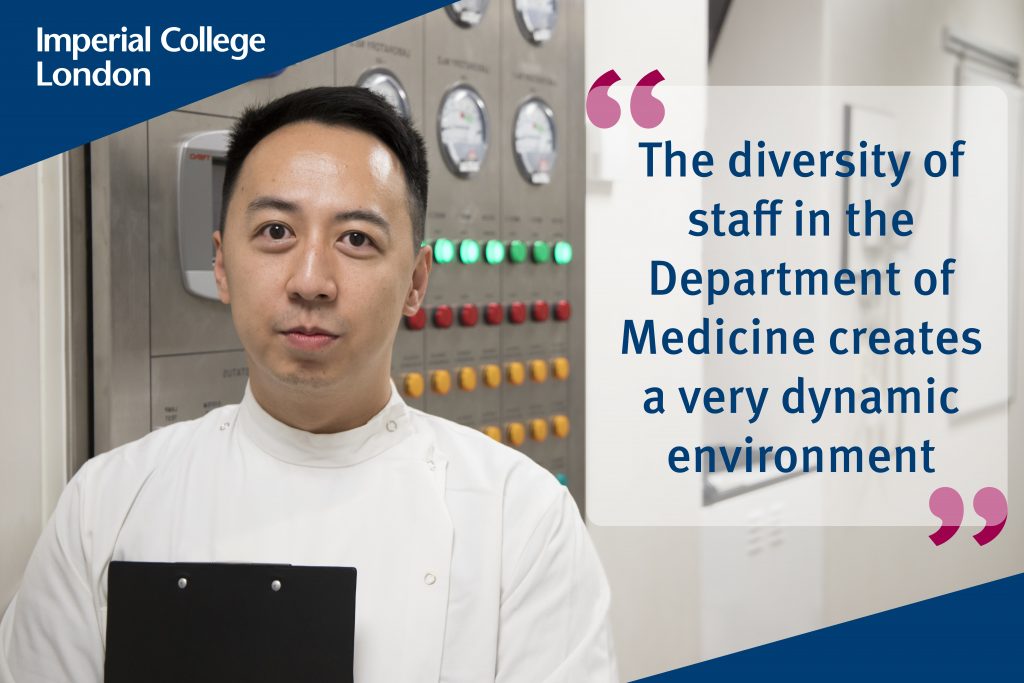
This post was originally published on the Department of Medicine Staff Blog on 4 July 2018.
For the latest edition of our Staff Profile series, we spoke to Dr Jacob Lee about his role as one of the Department’s Laboratory Managers.
What is your role in the Department?
My name is Dr Jacob Lee and I’m one of the Department’s Laboratory Managers. I’m typically the first point of contact for two large sections, for whom I provide advice and oversee safety, security and training for staff, students and visitors. As part of my position, I have taken on many other roles, including Section Safety Coordinator, Radiation Protection Supervisor, Suite/Facility Manager, First Aid Coordinator, Fire Warden, Manual Handling Assessor, Display Screen Equipment Assessor and Mental Health First Aider.
On a day-to-day basis, I manage the running of laboratory services, laboratory spaces, shared laboratory equipment and the general office environment. I also look after laboratory finances, act as one of the key contacts for local emergencies and incidents, and frequently liaise with Sales Reps, Contractors, Estates, Safety, ICT, Security, administrative and operational members of staff.
When did you first join the Department, and where were you working before?
I completed my PhD in mineralised tissue stem cell biology, where I investigated if stem cells from our teeth could be differentiated into other cell types (fat, cartilage and bone). Following this, I was employed in a cancer bio repository for two years, working closely with clinical staff for the collection of small amounts of cancer patient blood and tissue to supply to cancer researchers. I joined Imperial College as a Trainee Laboratory Manager in January 2015 and I took over the role as Laboratory Manager in October of the same year.
What do you find to be the most challenging part of your role?
The role is extremely diverse and involves a multitude of scientific procedures and operational processes. A lot of the challenges come from novel or unusual tasks being undertaken in the lab, which present new hazards and risks and require a lot of research and planning. On top of this, there is always something that needs solving, repairing or processing. I look after over twenty PIs and their groups, students and senior management, and in trying to manage everyone’s expectations and deadlines, you really do get stretched!
What do you find to be the most rewarding part of your role?
I enjoy the working relationships I have built with all the people from the different job families I work with. I also like helping others and fulfilling requests, and the satisfaction that comes from resolving problems. Plus, the diversity of the role means I’m not necessarily desk-bound – some days I’ll be running around campus getting hands-on!
What are your biggest hobbies and passions outside of work?
I have been practicing yoga for five years, and it is good for my physical and mental wellbeing. Also, the challenge of achieving advanced poses is very rewarding (recently, I’ve been mastering headstands and arm balances!).
Your favourite thing about working in the Department of Medicine?
The people in the Department have been very friendly and helpful during my time here – they all play an important role, and I do not think I can do my job without everyone’s combined efforts. Medicine is one of the largest Departments, and the diversity of its staff creates a very dynamic environment.
If the Department could do one thing to improve its organisational culture, what do you think that should be?
I think there needs to be more appreciation and recognition of staff across the different job families – from Academic and Research, to Professional, Technical and Operational, to Learning and Teaching. Everyone should value each other’s contribution to the successful running of the Department, as this will ultimately make the working experience even more enjoyable.